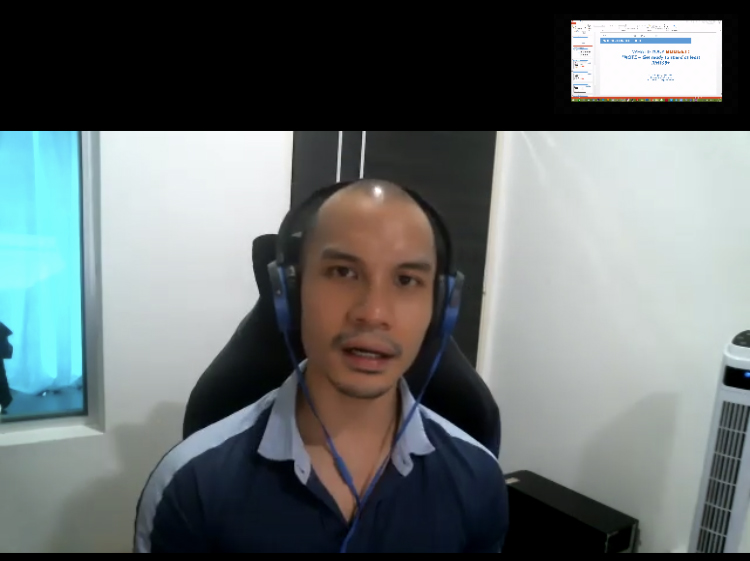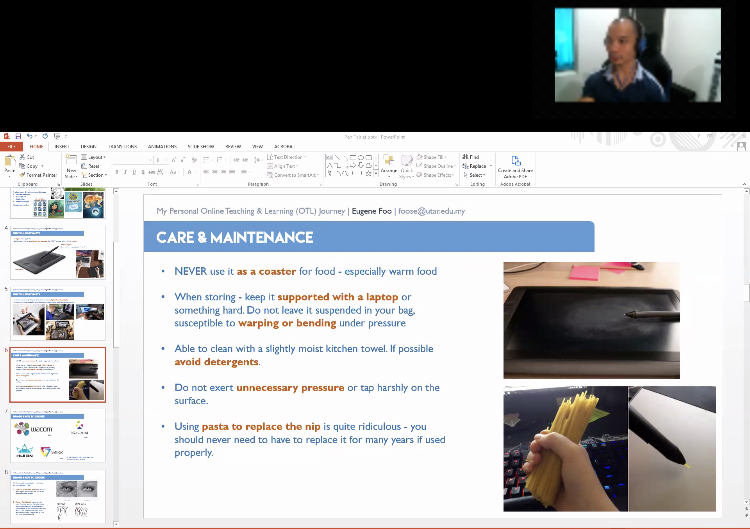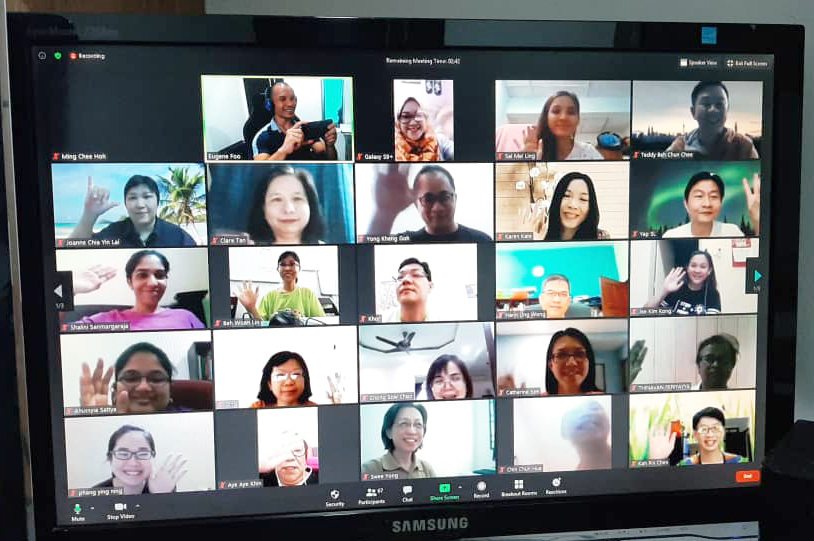
Enhancing OTL with pen tablet

Foo sharing his experience of using a pen tablet
An enlightening sharing session on pen tablet was co-organised by Curriculum Development and Innovation (CCDI) and Centre for Learning and Teaching (CLT) on 13 June 2020, via Zoom. The invited speaker was Faculty of Creative Industries Department of Multimedia Design and Animation Specialist Eugene Foo Shyang Eu.
The sharing session aimed to assist academics in enhancing their online teaching experience through the use of a pen tablet. With Foo sharing his experience in using this tool in the industry for his practice for more than a decade, participants learnt about the many interesting functions of a pen tablet, regardless of their fields. Whether it was for Physics, Mathematics and even Chemistry, the sharing session pointed out that pen tablet has indeed begun to find its place in online classrooms. Crucially in these times of a global pandemic, pen tablet is understood to be able to help enhance academics’ online teaching skills, making online teaching smoother and more interesting.
Foo kick-started the sharing session by defining a pen tablet, which is a digital drawing device. It usually comes with a specialised surface or pad that must be used with a paired stylus. He went on to explain the care and maintenance of a pen tablet, and highlighted participants to never use the pen tablet as a coaster for food, especially warm food.

Foo explaining the care and maintenance of a pen tablet
He also advised, “When storing the device, be sure to keep it supported with a laptop or something hard. Do not leave it suspended in your bag, because the device is susceptible to warping or bending under pressure. You can also clean the surface slightly using a moist kitchen towel and, if possible, avoid using detergents because we are not sure what the chemicals from the detergents would do to the pen tablet’s surface. Also, it is important to not exert unnecessary pressure or tap harshly on the surface.”
He went on listing a few famous brands of pen tablets that are available in the market and gave some brief review for each brand. He also mentioned the price comparisons of the pen tablets and places where participants can purchase the pen tablets from.
“Some of the requirements you should look into before buying a pen tablet is its Lines Per Inch (LPI) value. The LPI tells you how many digital lines fit into one inch of the tablet’s physical screen. Thus, the higher the LPI value, the better. As for the Report Rate Speed (RRS), it measures how many times per second the tablet sends information about the stylus position and pressure back to the computer. The higher the RRS, the smoother the lines. Most modern tablets have a report rate of 200+, which is fairly standard,” explained Foo.
He added, “You also must look into its pressure sensitivity, which determines how much you can vary the width of lines you paint. This is done by applying different pressure on the tablet surface. The Active Area refers to the area that is reading your stylus activity on the physical surface. There is a border around the active area that does not read anything. Again, the higher the value, the better the pen tablet.”
He also advised participants to be ready to spend above RM150 and more. He also pointed out that when shopping online for pen tablets, buyers must look at other buyers’ reviews and where the device is shipped from. Some of the tips and tricks he shared on using the pen tablet, included, to no hover the stylus and just hold it like it’s a pen. He also mentioned that participants should set a comfortable physical space and observe how one might move their hands. He further explained the use of shortcut keys and the use of paper on the surface to give the stylus more friction.
Towards the end of his sharing session, Foo gave a live demonstration of using a pen tablet. The sharing session ended with an interactive Q&A session.
Foo demonstrating how to use a pen tablet

A screenshot of participants at the sharing session
![]()
© 2020 UNIVERSITI TUNKU ABDUL RAHMAN DU012(A).
Wholly owned by UTAR Education Foundation Co. No. 578227-M LEGAL STATEMENT TERM OF USAGE PRIVACY NOTICE